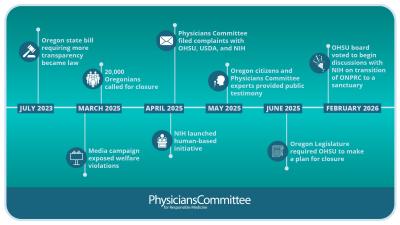Persistent Issues With the Journal Nutrients and Its Publisher MDPI

To achieve high standards in scientific publication, journals and publishers should focus on what readers need most — high-quality, honest, and relevant research. Journals and publishers act as gatekeepers to the scientific literature that informs advancements in medicine, public health, safety, and much more. Many journals and publishers make every effort to maintain the integrity of scientific literature. Others, like the journal Nutrients and its publisher, MDPI, fall short.
1. Nutrients fails to abide by its own policy of avoiding animals use where alternatives exist.
Although Nutrients purports to be a human clinical nutrition journal, nearly 20% of its articles represent animal experiments. Most, if not all, of these articles, violate Nutrients' own policy not to publish animal experiments where alternatives exist, as these studies could have been conducted ethically with humans or human-relevant alternatives to the animal tests. Rather than use animals, human-focused studies would have provided clinically meaningful data to inform human health conditions.
- In a recent study, experimenters confined and socially isolated monkeys in an attempt to study the effects of a Mediterranean diet on mental and brain health. Multiple animals died during the study. Those who survived were enrolled in subsequent research experiments. There is no rationale for animal use in human nutrition research given the abundance of human studies examining Mediterranean diets. Numerous large-scale studies have already ethically studied the impact of diet on mental and brain health in humans using observational techniques and noninvasive measures like blood draws and medical imaging.
- Another experiment used pigs in an attempt to evaluate how diets rich in fruits and vegetables can improve human microbiome health. The animals were killed after just two weeks. The goals of the study could have been accomplished without using animals. Using blood and fecal samples, several studies have already investigated the effects of a diet rich in fruits and vegetables on the blood transcriptome and the microbiome directly in humans.
- In another paper, the manufacturer of a saffron-based nutrition supplement explored the spice’s purported mood-boosting properties. But rather than administering the supplement to volunteers and tracking their depressive symptoms with validated instruments, as other researchers have done, the manufacturer force-fed saffron to mice via gavage and dropped the animals in water tanks to conduct forced swim tests in an attempt to measure mood.
To help build human-relevant literature, when humans or human-relevant methods can be used, Nutrients should enforce its existing policy not to publish animal experiments.
2. Nutrients and MDPI’s pay-to-publish framework overlooks scientific quality.
In 2018, 10 senior editors resigned from Nutrients, reportedly because the publisher, MDPI, pressured them to accept manuscripts of mediocre quality and importance. Authors pay fees per published article, so the publisher has the incentive to publish as many as possible.
Franck Vazquez, MDPI’s CEO at the time, claimed that “if more papers are good enough, more should be published.” He also asserted that editors should be focused more on publishing “even when it is not very novel” rather than trying to increase or preserve the impact factor of the journal.
It’s not surprising then that Nutrients, which was founded in 2009, has experienced a phenomenal growth rate over the years. From 2012 to 2022, the number of papers published grew by 3,903% to more than 5,400 publications in 2022. The journal has maintained an average annual growth rate of 58% over the past five years. All while the time from manuscript submission to first decision is at an all-time low — just 13.7 days. As pay-to-publish journals become increasingly prevalent, the financial motives of publishers become increasingly questionable. MDPI, which publishes 427 journals (23 of which were launched in 2023), charges thousands of dollars for each published article (more than $2,900 in the case of Nutrients). The pay-to-publish model creates a race to publish in order to bank author fees and a disincentive to careful screening of submissions for adherence to ethics policies. In 2022, Nutrients brought in over $15.8 million in articles fees.
3. The Journal’s Response to Repeated Ethical Complaints Is Inadequate
The Nutrients editors recently published a commentary entitled, “Animal Research: Transparency and Obligations,” in which they wrote:
Nutrients actively supports the long-established international regulations on animal experiments carried out by scientific institutions and pursues the enforcement of these…. [W]e all agree that animal experimentation should never be the preferred method of testing…. We would like to call on all institutions that carry out such tests to do everything in their power to adopt the necessary measures and controls so as to obviate the need for animal experimentation in the first place…. As a global scientific community, we have the potential to think our way towards a better future—and a moral obligation to do so.1
Problems Continue
Regrettably, the editors’ words do not appear to be reflected in changes in the journal itself. On January 11, 2024, Nutrients published an article describing a series of experiments to determine the Glycemic Index of rice cakes in cynomolgus monkeys.2 Determining the Glycemic Index of foods is a straightforward process in humans. It involves giving carbohydrate-containing foods to human volunteers and assessing the subsequent blood sugar response.
The test is not conducted in nonhuman animals. The use of monkeys would mean scientific problems and serious stressors for the animals. Prior to each test series, the monkeys were deprived of food for 16 hours. They were force-fed a glucose solution using nasal gavage, a highly stressful procedure. This was done twice for each product tested. Then, because monkeys resist blood draws, they were restrained in a “monkey chair” so that blood could be drawn. Restraint is highly stressful for monkeys and all other animals. The experimenters acknowledged this and, so, forced the animals into the chair in advance of the experiments to attempt to accommodate them to it. The experimenters drew blood eight times via fingerstick for each product tested (twice at baseline and once at six subsequent times). This is tolerable for human subjects but highly stressful for animals because it requires restraint, manipulation by laboratory personnel, and repeated physical pain. In laboratories, monkeys also experience the chronic stresses of caging, restricted movement, artificial light/dark cycles, inability to pick social groups, handling and instrumentation by laboratory personnel, and other stressors of the laboratory environment.
The Glycemic Index was invented by researcher David Jenkins of the University of Toronto and was first described in 1981.3 Regarding Nutrients’ decision to publish results on monkeys, Dr. Jenkins had this to say:
Our research team developed the Glycemic Index based on human studies, and there is no rationale or justification for using any other species. If species differences were to be identified for Glycemic Index values, our first assumption would be the effects of inherent stress on animals in the laboratory setting. In short, I believe Glycemic Index testing must be done in humans.
In addition to the inappropriate use of animals in the study design, the article itself reveals sloppy review. Text from the article appears to have been copied and pasted from a human research protocol. The monkeys are described as having been screened for a psychiatric diagnosis, drug/alcohol abuse, use of psychoactive drugs, and use of oral contraceptives. The fact that the article proceeded through to publication despite the nonsensical wording about drug/alcohol abuse, etc., and the obvious misapplication of the Glycemic Index suggests that the review process, such as it is, fails to filter out articles reporting irrelevant and unethical experiments.
While Nutrients has explicit, albeit modest, ethics guidelines, it does not enforce them. The journal would do best to focus on human nutrition research. Dr. Jenkins wrote:
Overall, animal testing has greatly inhibited the development of good techniques for human research. For glycemic studies, we should be using continuous glucose monitoring in humans, with automatic Mean Amplitude Glycemic Excursions calculations, etc. I would strongly encourage Nutrients to desist from taking animal “nutrition” research and to focus on human research.
References
- Fernandez ML, Serra-Majem L. Animal Research: Transparency and Obligations. Nutrients. 2023 Dec 20;16(1):20. doi: 10.3390/nu16010020. PMID: 38201849; PMCID: PMC10780765.
- Yang Y, Liu Q, Yue F. Glycemic Response in Nonhuman Primates Fed Gluten-Free Rice Cakes Enriched with Soy, Pea, or Rice Protein and Its Correlation with Nutrient Composition. Nutrients. 2024;16(2):234. doi:10.3390/nu16020234
- Jenkins DJ, Wolever TM, Taylor RH, Barker H, Fielden H, Baldwin JM, Bowling AC, Newman HC, Jenkins AL, Goff DV. Glycemic index of foods: a physiological basis for carbohydrate exchange. Am J Clin Nutr. 1981 Mar;34(3):362-6. doi: 10.1093/ajcn/34.3.362.







